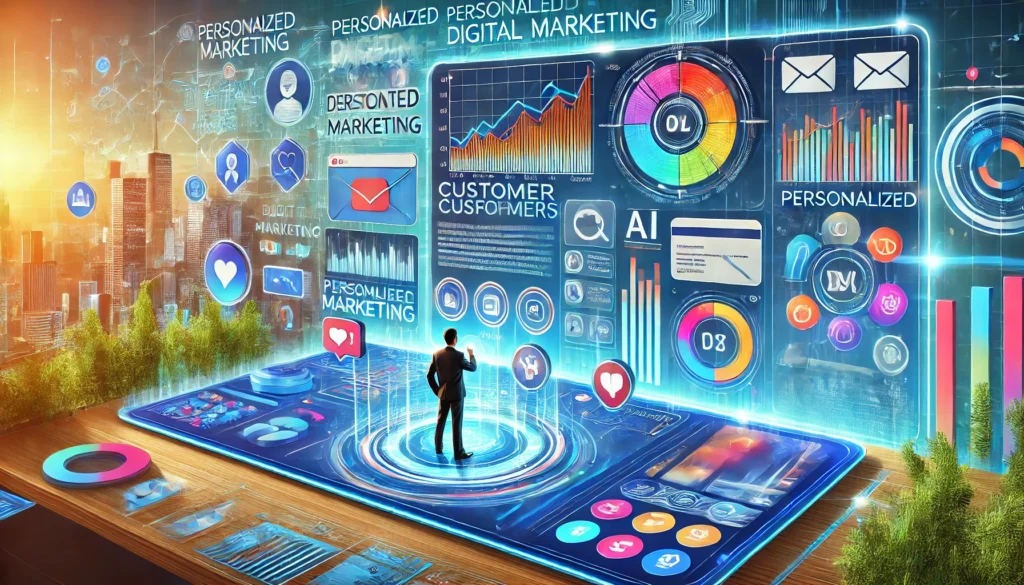- By: Ajay
- Comments (0)
- Dec 3
Why Personalization is the Future of Digital Marketing

In the rapidly evolving landscape of digital marketing, one trend has consistently gained traction: personalization. The ability to deliver tailored experiences and content to customers is no longer a luxury; it is a necessity. Personalization has reshaped how businesses connect with their audiences, transforming generic campaigns into highly targeted strategies that yield better engagement, higher conversions, and increased loyalty.
In this article, we’ll explore why personalization is critical to the future of digital marketing, how it benefits businesses, and the strategies to effectively implement it.
What is Personalization in Digital Marketing?
Personalization in digital marketing refers to the practice of using data and insights to create customized experiences for users. This could include tailoring email content, website experiences, product recommendations, and advertisements based on an individual’s preferences, behaviors, and demographics.
For instance, instead of a one-size-fits-all approach, personalization allows marketers to display a product a customer has previously browsed or suggest content based on their past interactions.
Why Personalization is Transforming Digital Marketing
Enhanced Customer Experience
Modern consumers expect more than just generic advertising; they seek relevant and meaningful interactions. Personalization enhances the customer journey by making it more intuitive and engaging. For example, Netflix’s recommendation system and Amazon’s product suggestions are prime examples of how personalization creates seamless and satisfying user experiences.
Improved Conversion Rates
Tailored messaging has a significant impact on buying decisions. According to studies, personalized email campaigns have a 26% higher open rate and a 20% higher click-through rate than non-personalized ones. By presenting the right message at the right time, businesses can drive customers to take action.
Better ROI on Marketing Efforts
Personalization allows businesses to optimize their marketing spend by targeting the most relevant audiences. Instead of casting a wide net, marketers can focus on high-intent users, ensuring higher returns on investment for campaigns.
Strengthened Customer Loyalty
Building trust is essential in digital marketing, and personalization plays a pivotal role in fostering customer loyalty. When customers feel understood and valued, they are more likely to return, recommend, and engage with a brand. Loyalty programs with personalized offers are a great example of this approach.
The Role of Data in Personalization
Data is the backbone of personalization in digital marketing. It provides insights into customer behavior, preferences, and needs, which can be used to craft tailored experiences. The primary sources of data include:
- Behavioral Data: Tracking website activity, clicks, and purchase history.
- Demographic Data: Information like age, location, gender, and income.
- Psychographic Data: Interests, values, and lifestyle choices.
- Transactional Data: Previous purchases, payment methods, and order frequency.
Artificial intelligence (AI) and machine learning technologies are increasingly being used to analyze this data at scale, making real-time personalization possible.
Top Personalization Strategies in Digital Marketing
Segmentation-Based Campaigns
Segmenting your audience based on demographics, interests, or behaviors ensures that marketing messages resonate with specific groups. This can be applied in email marketing, social media campaigns, and paid advertisements.
Dynamic Website Content
Personalizing website content based on the visitor’s profile or behavior can significantly improve user engagement. For instance, showing location-based offers or product recommendations tailored to browsing history.
Personalized Email Marketing
Email remains one of the most effective tools in digital marketing. Incorporating personalized subject lines, tailored content, and dynamic visuals can drive better results. Tools like Mailchimp and HubSpot make this process seamless.
AI-Powered Chatbots
Chatbots equipped with AI can provide personalized support by learning from customer interactions. They can recommend products, answer questions, and even assist with transactions in a highly tailored manner.
Location-Based Marketing
Using geotargeting to send relevant offers to customers near a business location is a powerful personalization tactic. Push notifications from mobile apps are particularly effective in this regard.
Challenges in Personalization and How to Overcome Them
Data Privacy Concerns
Consumers are increasingly aware of how their data is used, making transparency and compliance with regulations like GDPR and CCPA crucial. Brands must adopt ethical data collection practices and ensure secure storage.
Technology Integration
Implementing personalization requires integrating various tools and platforms. Businesses should invest in advanced CRM systems and marketing automation tools to streamline their efforts.
Balancing Personalization and Intrusion
While customers value tailored experiences, overdoing it can feel intrusive. Maintaining a balance is key to ensuring personalization remains a positive experience.
The Future of Digital Marketing is Personalization
As digital technologies continue to evolve, personalization will remain a cornerstone of effective digital marketing. The days of generic, mass-marketing campaigns are behind us. In their place are hyper-targeted strategies that deliver value to customers while driving results for businesses.
To thrive in this competitive landscape, companies must embrace personalization at every touchpoint. By leveraging the power of data, AI, and automation, businesses can create meaningful connections, enhance customer loyalty, and achieve long-term growth.

